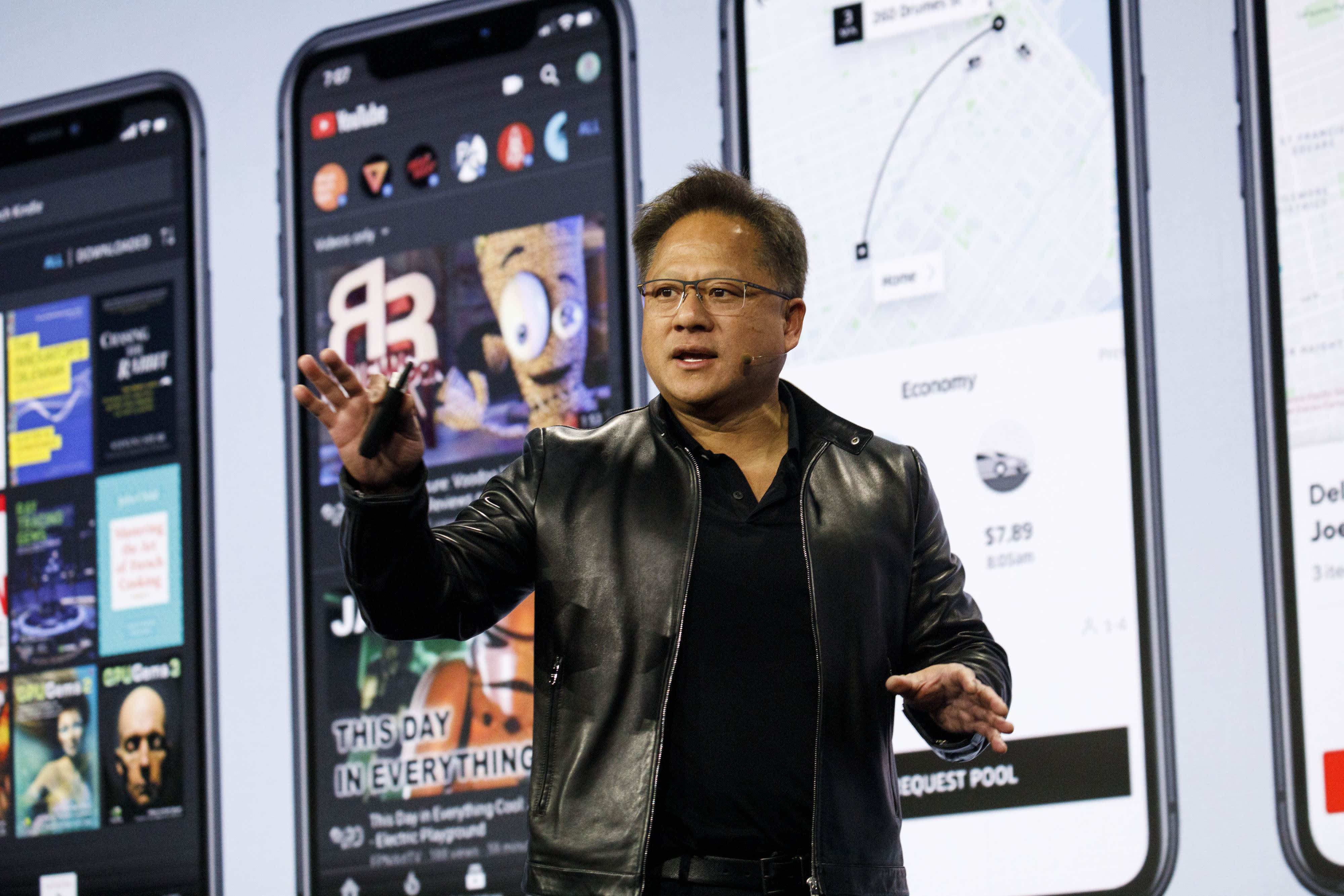
Jen-Hsun Huang, president and chief executive officer of Nvidia Corp., speaks during the company’s event at Mobile World Congress Americas in Los Angeles on Oct. 21, 2019.
Patrick T. Fallon | Bloomberg | Getty Images
Nvidia‘s $40 billion acquisition of U.K. chip designer Arm is looking increasingly unlikely to go through, according to Gartner semiconductor analyst Alan Priestley.
The deal is facing a growing number of regulatory probes around the world, Priestley said, pointing to concerns in the U.K., the EU, the U.S. and China.
“I believe it’s highly unlikely it will go through,” Priestley told CNBC Wednesday. Nvidia and Arm did not immediately respond to a CNBC request for comment.
The deal was set to be completed by March 2022 but Nvidia CEO Jensen Huang admitted in August that it would probably go beyond that date.
Arm was spun out of an early computing company called Acorn Computers in 1990. The company’s energy-efficient chip designs are used in 95% of the world’s smartphones and 95% of the chips designed in China. The company, bought by Japan’s SoftBank in 2016 for £24 billion ($32 billion), licenses its chip designs to more than 500 companies who use them to make their own semiconductors.
Critics are concerned that the merger with Nvidia — which designs its own chips — could restrict access to Arm’s “neutral” semiconductor designs and may lead to higher prices, less choice and reduced innovation in the industry. But Nvidia argues that the deal will lead to more innovation and that Arm will benefit from increased investment.
Regulators circle
While U.S. chip giant Broadcom has come out in support of the deal, many others are against it.
Rival Qualcomm has said that Nvidia could limit the supply of Arm’s technology to its competitors or raise prices. Google and Microsoft have raised the same concerns with regulators, according to Bloomberg.
On Thursday, the Federal Trade Commission sued to block the deal on antitrust grounds.
“The proposed vertical deal would give one of the largest chip companies control over the computing technology and designs that rival firms rely on to develop their own competing chips,” the FTC said in an announcement.
It added: “The complaint alleges that the proposed merger would give Nvidia the ability and incentive to use its control of this technology to undermine its competitors, reducing competition and ultimately resulting in reduced product quality, reduced innovation, higher prices, and less choice.”
In November, the U.K. government announced that it wants a full-blown investigation into the takeover of Arm, which is headquartered in Cambridge and widely seen as the jewel in the crown of the British tech sector.
Digital and Culture Secretary Nadine Dorries ordered a “phase 2” probe into the deal. The probe — to be carried out by the Competition and Markets Authority over a 24 week period — will investigate antitrust concerns and national security issues.
Meanwhile, the European Commission, the executive arm of the EU, launched its own in-depth investigation into the deal in October.
“Whilst Arm and Nvidia do not directly compete, Arm’s IP is an important input in products competing with those of Nvidia, for example in datacenters, automotive and in internet of things,” Margrethe Vestager, the European Commission’s executive vice president, said in a statement. “Our analysis shows that the acquisition of Arm by Nvidia could lead to restricted or degraded access to Arm’s IP, with distortive effects in many markets where semiconductors are used.”
In China, the state-backed Global Times newspaper said the deal was “disturbing” and urged regulators to treat it with caution.
A Nvidia spokesperson told CNBC that combining the two companies provides a good opportunity for the industry and customers.
“With Nvidia’s scale, capabilities and robust understanding of datacenter computing, acceleration, and AI, we can assist Arm in expanding their reach into data center, IOT and PCs, and advance Arm’s IP for decades to come,” they said. “The combination of our companies can enhance competition in the industry as we work together on further building the world of AI.”
They added: “Despite these concerns and those raised by some Arm licensees, we continue to believe in the merits and benefits of the acquisition to Arm, its licensees, and the industry.”
Arm IPO?
People have been wondering whether the deal would be permitted by the regulators ever since it was first announced.
Last October, tech investors Ian Hogarth and Nathan Benaich were among the first to publicly predict that it will be blocked.
“We wouldn’t be surprised at all if it was blocked by somebody,” Hogarth, who sold his start-up Songkick to Warner Music Group before becoming an angel investor, told CNBC at the time.
Hogarth told CNBC on Friday that he thinks the deal has a less than 25% chance of going through following the FTC’s decision to sue.
Kings College, Cambridge is pictured deserted due to the coronavirus outbreak.
SOPA Images
Speaking to CNBC this week, Gartner’s Priestley said SoftBank would likely try and list Arm on the stock market if the Nvidia deal falls through.
“They’ll probably try and IPO it,” he said.
The London Stock Exchange and New York’s Nasdaq stock market are two potential listing destinations, but Priestley said he wasn’t sure how well Arm would fare on its own.
“The issue Arm has, and this is the issue SoftBank faced, is how it drives its revenue,” Priestley added. “IP licensing is great but it’s really hard to squeeze it.”
Source: CNBC
